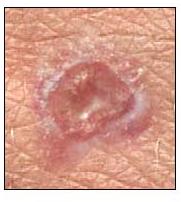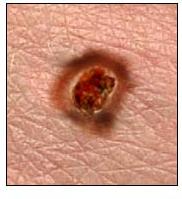| What is skin cancer? |
Skin cancer is the uncontrolled growth of abnormal skin cells. Other than that, it will occurs when unrepaired DNA damage to skin cells (most often caused by ultraviolet radiation from sunshine or tanning beds) triggers mutations, or genetic defects, that lead the skin cells to multiply rapidly and form malignant tumors. Skin cancer affects people of all colors and races, although those with light skin who sunburn easily have a higher risk.
 Basal Cell Carcinoma Basal Cell Carcinoma |
 Squamous Cell Carcinoma Squamous Cell Carcinoma |
| What are the types of skin cancer? |
There are several types of skin cancer such as Basal Cell Carcinoma, Squamous Cell Carcinoma, Melanoma and Actinic Keratosis.
- Basal cell carcinoma (BCC)
BCC is a uncontrolled growths or lesions that arise in the skin’s basal cells, which line the deepest layer of the epidermis. It usually, caused by a combination of cumulative UV exposure and intense, occasional UV exposure. BCC can be highly disfiguring. BCC look like open sores, red patches, pink growths, shiny bumps or scar.
- Squamous cell carcinoma (SCC)
The SCC is the second most common form of skin cancer. SCC is an uncontrolled growth of abnormal cells arising in the squamous cells, which compose most of the skin’s upper layer. SCC is usually caused by cumulative UV exposure over the course of a lifetime. SCC often look like scaly red patches, open sores, elevated growths with a central depression, or warts they may crust or bleed.
- Melanoma
Melanoma is the most dangerous form of skin cancer, these cancerous growths develop when unrepaired DNA damage to skin cells trigger mutation that lead the skin cells to multiply rapidly and form malignant tumors. Usually melanoma is caused mainly by intense, occasional UV exposure, especially in those who are genetically predisposed to the disease. The majority of melanomas are black or brown but they can also be skin-colored, pink, red, purple, blue or white.
- Actinic Keratosis (AK)
Actinic Keratosis is a scaly or crusty growths which caused by damage from the sun’s ultraviolet (UV) rays and also known as solar keratoses. These types of skin cancer usually turn skin color become red, but some will be tan, pink, red and/or flesh-toned. Usually, it will appear on sun exposed areas such as face, bald scalp, lips and the back of the hands.
| What is the risk factor of Skin Cancer? |
There are several risk factor that can cause development of skin cancer such as mole, exposed to sunlight and many more. People that have this symptom better to see the doctor for advise. If not prevent this symptom early they may spread into others parts of body.
- Fair Skin
Having less pigment (melanin) in skin provides less protection from damaging UV radiation. This is higher risk to people who have blond or red hair and light-colored eyes and freckle or sunburn easily, more likely to develop skin cancer than is a person with darker skin.
- Excessive sun exposure
People who spend more time in the sun may develop skin cancer especially if the skin is not protected by any cloth or sunscreen. Tanning, including exposure to tanning lamps and beds also puts you at risk. A tan is skin’s injury response to excessive UV radiation.
- Moles
The possibility skin cancer becomes high if people who have many moles or abnormal moles called dysplastic nevi. It usually look irregular and are larger than normal moles.
- A history of sunburns
People who had sunburns during a child or teenager increase the risk of developing skin cancer as an adult.
- Sunny or high-altitude climates
People who live at higher elevations, where the sunlight is strongest also exposes to more radiation. Radiation that is too high will increase the factor to get cancer.
- Family History
If one of parents or sibling has had skin cancer, the possibility to get the skin cancer is high.
- Exposure to radiation
People who received radiation treatment for skin conditions such as eczema and acne may have an increased risk of skin cancer, usually basal cell carcinoma types.
- Exposure to certain substance
Exposure to certain substance, such as arsenic, may increase risk of skin cancer.
- Weakened immune system
Weakened immune systems will high the risk of developing skin cancer. People who living with HIV/AIDS and those taking immunosuppressant drugs after an organ transplant also had the higher risk of skin cancer.
 |
Search for Best Treatment Skin Cancer in Google search here |
